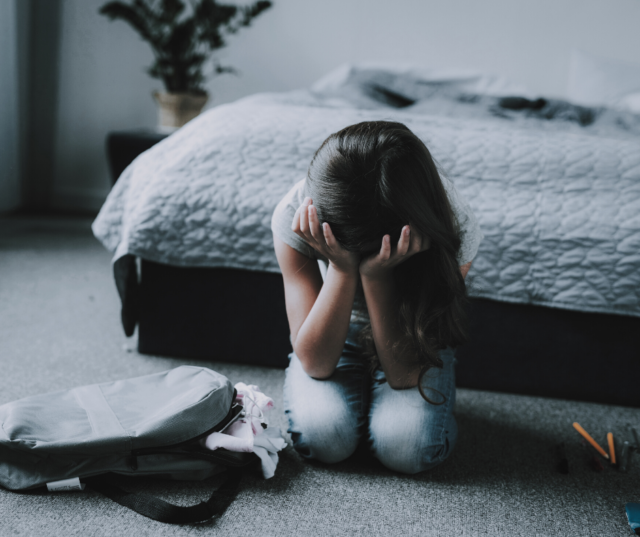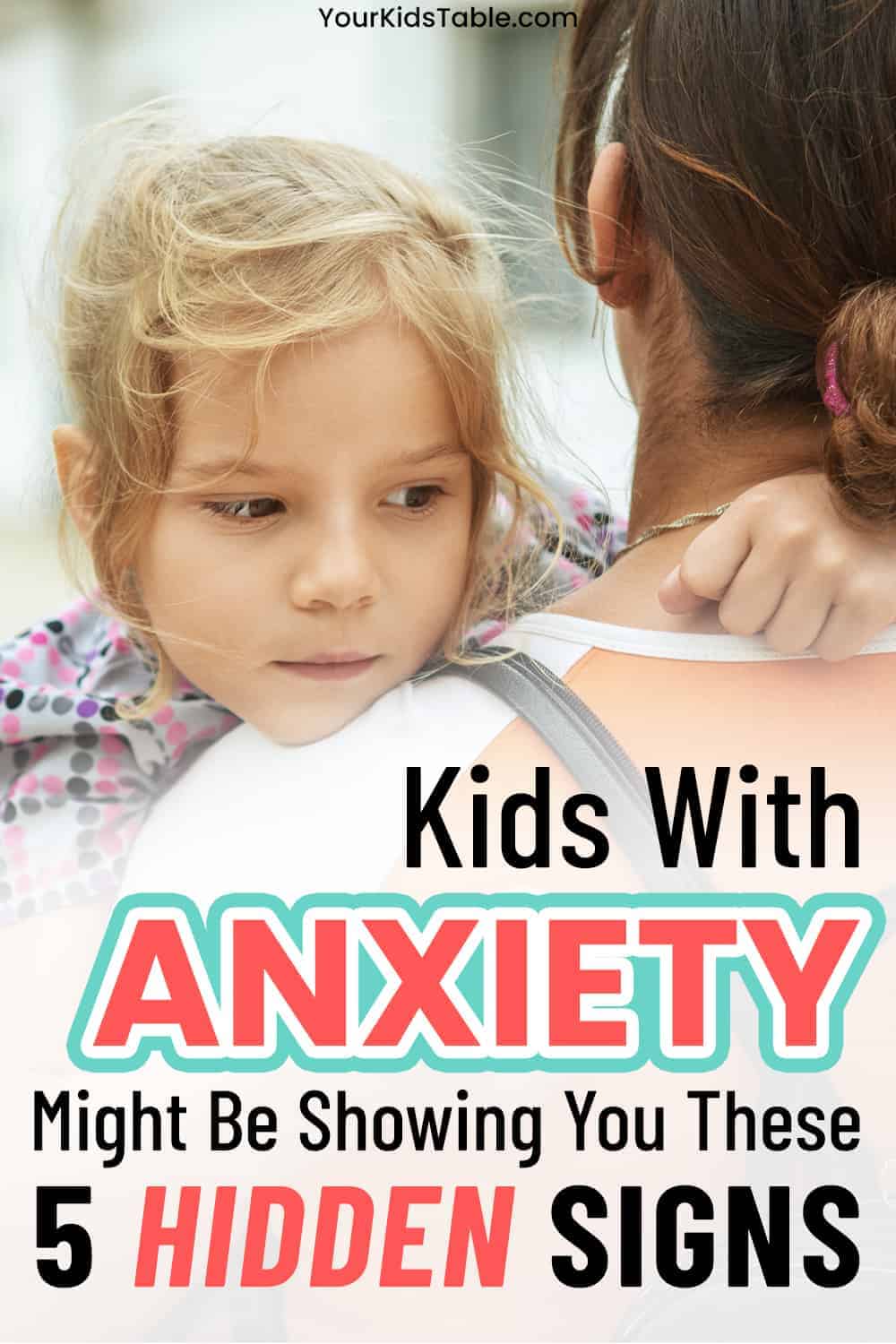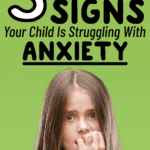Could your child have anxiety? Learn 5 sneaky signs of anxiety in children from an expert therapist so you can help your child.
Affiliate links used below. See our full disclosure.
When my son was 7, he showed his first sign of anxiety and I missed it.
I, the occupational therapist that had worked with hundreds of kids, totally didn’t realize that my son’s crying and freakouts about going to school were due to anxiety. In his case, it happened over-night. Seemingly out of nowhere.
I had never seen this behavior in him before and I’m ashamed to admit that I thought it was a phase or that he was being bad in some way.
Gosh, it’s hard to type those words and admit to myself that I reacted that way, especially now that coping with anxiety for two of my children is a way of life.
I couldn’t get over the fact that his actions (the crying and dramatic clawing at me for dear life as the bus pulled in to pick up kids for the day) were so out of character.
I felt annoyed, exhausted, and was just waiting for him to go back to happily hopping on the bus each day.
After 5 days, I couldn’t ignore the signs anymore and I reached out to friends for prayers and advice. At that point, it was obvious that my son was experiencing some sort of anxiety and I was doing nothing to help him.
This is a difficult story to share because it’s not how I want to show up as a parent. I want my kids to feel 100% supported, and in this instance, that’s not what happened. But, I also have to give myself some grace, because anxiety is not my expertise.
And, we do better when we know better.
That’s why I’m sharing this story with you, I know I’m not alone. Many kids (and parents) are struggling with these big feelings that feel out of control, scary, and overwhelming.
Those feelings could be caused by anxiety.
Once you know that there’s a connection, it changes everything. Instead of feeling drained, you feel empowered. Instead of waiting for it to end, you get down on your child’s level and you help them.
The truth is that while I did help my son, it was just the beginning of a journey. It got better and then it got worse. A year and a half later, my son’s anxiety got so bad he was struggling to leave the house at all and was experiencing anxiety attacks.
You know what got us through?
What changed absolutely everything?
Natasha Daniels, LCSW Child Therapist, creator of Anxious Toddlers to Teens, my absolute go to expert! Specifically her exceptional work in the online course, Crush Anxiety, an online course she created to help parents like me and you that don’t know how to help their kid with anxiety.
I am beyond excited to welcome Natasha to Your Kid’s Table today to share with you the signs of anxiety that we frequently miss as parents. It’s an honor to have her here. I’ll let Natasha take it away…

Important Signs That a Child Might Be Struggling With Anxiety
Often, when we think of an anxious child, we imagine a scared, timid child who is clinging to our legs. Of course this can be true but this stereotype can blind us and prevent us from seeing anxiety, even when we are staring right at it.
If we miss anxiety, we miss an important opportunity to empower our child and build their skills to live a happier life. We’re also going to feel super frustrated, because most typical parenting approaches won’t work on anxiety.
So, that won’t be fun.
Let me break down some of the major signs that a child might be struggling with anxiety. These are just some red flags and aren’t meant to be used to diagnose anxiety. As always, it’s important to get the guidance of a qualified professional in your area.
Let’s dig in… Here Are 5 Areas That Are Often a Sign of Anxiety in Children
1. Sleeping and eating become a battle
Anxiety loves to creep in at night and get cozy with our kids. Nighttime brings many things with it. Darkness. Separation. No distractions. An 8-hour mini-death.
All of which can make a child very nervous to go to sleep.
If your child is:
-
-
- Scared to sleep on their own
-
- Wants you to check on them often
-
- Winds up in your bed most nights
-
- Takes forever to go to sleep
-
You might want to explore the issue further and see what lies underneath those behaviors.
And then there is mealtime…
Anxiety also likes to make our children super picky about their food. They might wonder what’s in their food. Is their food cooked enough? Is it too chewy? Will they choke? Will it have a surprising taste or texture? Will it touch their other foods? What brand is the food?
The list can go on and on.
Many anxious kids also have sensory issues and some even have Sensory Processing Disorder (SPD). Not every child with SPD has anxiety, and not every child with anxiety has SPD, but
anxiety and sensory struggles do love to hang out together.
2. You hear constant complaints about your child not feeling well
Anxiety doesn’t just impact the mind, it impacts the body. It has direct access to your child’s digestive tract, your child’s heart rate, your child’s bowel movements (or lack thereof), your child’s ability to swallow and so much more!
When you start to see these physical complaints before school, bedtime, or other activities, you want to pay attention to those patterns. Often, when anxiety shows up, so do the physical complaints.
It’s always good to rule out any medical origin first, but when the doctors are left scratching their head, you want to expand your search to possible anxiety-related causes as well.
3. Your child gives you a hard time about going to school
Many kids don’t like going to school, but some anxious kids will have sheer panic about going. School brings with it many anxiety triggers. Often anxious kids feel sick, and with that comes the fear they might throw up in front of others.
They can also worry about separating from their parent, often their mom. The idea of separating can make them feel sick to their stomach, which fuels more anxiety. It is a vicious cycle.
Kids can also worry about perfectionism, grades, angry teachers, judgmental peers, and germs – just to name a few school-related anxiety themes.
If you have been dealing with school battles and your child is doing well socially and isn’t being bullied, you might want to explore some possible anxiety-rooted issues.
4. Your child wants to avoids things
Anxiety’s favorite fuel is avoidance. The more a child avoids, the bigger the anxiety grows.
The more the anxiety grows, the more the child avoids. It is a perpetual cycle.
If you see your child refusing to do something that they used to do, you want to explore what is going on.
Some kids want to avoid being in social situations, being around crowds, going to school, going to restaurants, starting something new (like a new class or team) or just about anything else!
If you see your child avoiding places or situations, you might want to do some further digging to find out the core reason behind the avoidance. Kids will often give parents throw away answers like, “it’s boring” or “it’s dumb!” But don’t always take those answers at face value.
Keep digging, just to be sure you aren’t missing something.
5. Your child doesn’t want to do anything independently
The last common sign of anxiety I’ll cover here is a lack of independence. When this is an issue, you’ll have a shadow. Wherever you go, your child doesn’t seem too far behind. Sometimes parents don’t notice this at first.
But when you start to pay attention, you start to realize that wherever you are, so is your child.
Your child might also demand that you or someone else come with them when they have to do something. If they have to go upstairs, you hear, “Can you come with me?”
If they have to brush their teeth, they ask, “Can you come with me?” In fact, as you start to pay attention, you might notice that your child requires someone to be with them all of the time.
This lack of independence is often driven by the fear that something bad will happen to them if they are alone. Most parents will say, “but nothing bad has ever happened to my child?”
Anxiety doesn’t care.
I’ve never been attacked by a shark, but sharks still scare me. Most kids with anxiety are afraid of things that they’ve never even experienced first hand.
Pay attention to your child’s need to not be alone. This is often one of the first signs that anxiety is knocking at the door.
3 Things Every Parent Needs to Know About Anxiety
I had a chance to sit down with Natasha Daniels and ask 3 questions that I’ve heard so many parents ask and that I’ve asked myself:
- What are we in danger of if we ignore or minimize our child’s anxiety?
- Do parents cause their child’s anxiety?
- What’s 1 step parents can take today to help their child with anxiety?
Her answers are poignant, helpful, and most importantly honest. Tap or click to listen below…
What to Do When Your Child Shows Signs of Anxiety…
Did some of these signs sound familiar? If you are concerned, it can never hurt to take your child to a therapist to get an assessment. Being proactive is the best line of defense against anxiety.
Also, regardless of whether your child has been formally diagnosed with anxiety or not, there are TONS of things parents can do on their own to arm their child with skills that can last a lifetime.
Read books that empower kids to fight their fears and work through their anxiety. Take online classes that walk you through building your child’s skills at home. Listen to podcasts, like the AT Parenting Survival Podcast, where you can learn how to parent anxious kids.
But whatever you do, don’t remain stagnant.
Anxiety should never be a “wait and see” kind of problem. Every child can be building their skills. Every child can be learning how to face their fears. Every child can live a life where anxiety does not hold them back. They just need you to show them.
Get the Crush Anxiety Class!
Natasha’s online class saved my child. It gave me clear and simple-to-use tools to help my child instead of watching him drown in his anxiety. In our case, it helped us avoid therapy. And, as a family, we had a new way to communicate about and cope with anxious feelings. The silver lining was that our bond was deepened so much further.
He knows he can come to me at any time and I’ll help him.
If you’ve been looking for tools and specific strategies to help your anxious child, then I can’t recommend Natasha’s Crushing Anxiety course enough.
Alisha Grogan is a licensed occupational therapist and founder of Your Kid’s Table. She has over 20 years experience with expertise in sensory processing and feeding development in babies, toddlers, and children. Alisha also has 3 boys of her own at home. Learn more about her here.



My 4 year old toddler is so scared to enter any public restroom…. she is fully trained here at home…. not even at school will she use the restroom… I need help… I feel like I’m failing
Hi Teresa,
You are not failing! There are so many kids who do not want to use public restrooms. Because she is fully trained at home, I would say she is likely fearful of something going on that is different. Have you looked at this article on sensory toilet problems? It may offer some insight!
Best,
Laura
Your Kid’s Table team member
My sister always struggled with public restrooms as a toddler. What really helped us were potty seat covers. She was always worried about germs so they were a life saver!
Very smart that you found this solution and figured out the cause! Thanks so much for sharing!
Best,
Laura
Your Kid’s Table OT
My 9 year old just started not wanting to sleep by herself. I feel like I’m failing as a parent. Before I realized it may be an anxiety issue, I was taking away privileges every night. She just cries and cries, we have tried breathing strategies and melatonin, but nothing seems to help. I just find myself yelling out of frustration, not only because she is regressing but because I don’t know how to help. I finally reached out to a therapist, but it will be a while until our appointment. Any pointers?
Hi Amber,
Check out the anxiety resources from my friend and anxiety expert, Natasha Daniels. She has lots of information that may help. You’re not failing her. Anxiety is such a tough beast, and your daughter is so lucky to have a parent who is learning what she needs and working to help her.
Here for you!
Laura
Your Kid’s table team member
My daughter is 6, almost 7 and the past couple weeks have been really rough with her. She has these fears of what if in her head and its always about getting in trouble at school. Shes never been in trouble at school and has always been such a happy go lucky kid. But she will worry herself all night about what if I looked at someone’s paper on accident? What if I lied to my teacher? What if I accidentally so something wrong? It makes me feel horrible because I’m not sure how to handle it and we are always lifting her up and re assuring her that we all make mistakes and thats okay. Well now she is going to her teachers asking these what if questions and they are obviously concerned, thinking she is doing something she shouldn’t be doing. Which I dont think she is, she really us well behaved and excels academically. It’s like shes trying to get in trouble, but shes terrified of it. I’m such at a loss with her right now and not sure what to do to help her get through this.
Hi Hannah,
Natasha at Anxious Toddlers (not just for toddlers!) is our favorite resource for anxiety. She has a ton of resources that may be a great fit for your daughter.
Best,
Laura
Your Kid’s Table team member
At what age are some of these behaviors normal? My 3 year old is very clingy at times, but I thought it was his age and temperament and he would outgrow it.
These behaviors can definitely be normal, depending on your child’s temperament and wiring, but when coupled together and affecting day to day life are worth looking into. I would definitely check out Natasha’s website for free information or consider her class if you think some of his behaviors are persistent or impacting his ability to participate in age appropriate activities. Otherwise he definitely may grow out of it!
Best,
Laura
Your Kid’s Table team member
I haven’t even read this post or looked more into the anxiety, although my daughter clicks every single one of these at times. My husband and I (I work Early childhood Intervention) have observed these and thought they were products of her watching so much tv, and that may be part of it, but I also have sort of suspected there was anxiety component as well. Now that I see this list. I know there is. I hate that she is anxious, but we can work on that. I have mentioned not noticing things with my kids to other parents who work with young children and are in similar professions. We agree that the saying “Doctor heal thyself: is a good saying for it and at least I think that is the saying that it can be harder for us to see the issues in our families when we spend all day dealing with the problems in other families.
Sarah,
I totally agree! It can be so much harder to see in our own children. But after you are mindful of what is happening you are able to get the resources you need! Hopefully this article will help you in your anxiety journey!
Best,
Desiree
the “click here link” was not enabled on page.
Sorry about that Ashley, but thanks for letting us know! It’s fixed now and you can also click here: https://anxioustoddlers.teachable.com/p/crush-anxiety?affcode=79884_mhxnwwsb